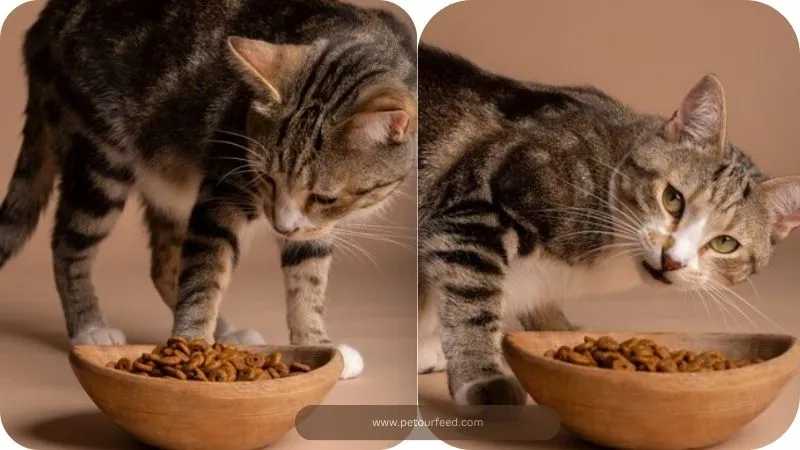When it comes to feeding cats chicken, it’s essential to understand that whole chicken can be a great source of protein, a cat’s diet needs to be balanced to ensure their overall health. In my experience working with various veterinarians and animal nutrition experts, I have learned that it’s essential to provide multiple nutrients beyond just meat.
Cats are natural carnivores and thrive on diets replicating what they naturally eat, such as mice and small rodents. This means incorporating chicken, fish, organic meats, and some vegetables in moderation. I highly recommend looking into comprehensive resources, like cookbooks from Dr. Andrea Tasi at the University of Pennsylvania, which can guide you in preparing homemade cat food that meets all your dietary needs.
Always consult with your vet for advice tailored specifically to your cat’s health. They can help you create a balanced diet rather than relying solely on processed foods or chicken.
Chicken and Its Role in a Cat’s Diet
Chicken is one of the most consumed meats worldwide and serves as a versatile protein source for humans and domesticated animals like cats. As natural carnivores, cats thrive on protein-rich diets, and chicken fits this requirement perfectly.
In addition to being a delicious treat, chicken provides essential nutrients that help keep our feline friends strong and energetic. While it’s tempting to share table scraps or serve chicken in various forms—like tacos, sandwiches, or nuggets—it’s crucial to ensure that any chicken offered to cats is free of harmful seasonings and additives.
Unlike some human foods, plain cooked chicken is non-toxic and can be beneficial within a balanced diet. Moreover, incorporating chicken into meals can mimic the sustenance wild cats would obtain from hunting birds and other small prey.
However, it’s important to remember that a cat’s digestive system is designed for a specific diet, and while chicken is a great protein source, it should not be the only component of their meals. Always assess the nutritional balance when feeding your cat, keeping their overall health in mind.
Health Benefits of Chicken

Chicken is a fantastic source of lean protein that can complement your cat’s diet while aiding in muscle building and maintaining overall fitness. Offering cooked chicken, particularly when baked or boiled, is ideal for your feline friend as it provides essential nutrients like selenium, vitamin B6, and phosphorus.
which are crucial for supporting their immune system, healthy bones, teeth, and the proper functioning of the liver, kidneys, and central nervous system. When serving chicken, ensure it is completely plain, free of spices, butter, dressings, and any extras, with bones removed to avoid choking hazards.
Canned Chicken
Canned chicken can be a safe option for cats if fed sparingly, but it’s vital to choose plain and unflavored varieties. Rinsing the canned chicken can help reduce excess sodium, essential for maintaining your cat’s dietary balance.
Fried Chicken
On the other hand, fried chicken should never be shared with your cat due to its significant amounts of spices, breading, and fat, which provide empty calories and could be harmful.
Chicken Nuggets
Similarly, chicken nuggets, often dressed with additional spices and high in fat, are unsuitable for cats and should be avoided.
Chicken Broth
Feeding cats Chicken broth can be safe for cats without high salt or added flavorings. It’s advisable to make your broth to avoid harmful additives, ensuring it’s a tasty snack that your kitty can enjoy without any health risks.
Chicken Broth
Chicken broth can be safe for cats without high salt or added flavorings. It’s advisable to make your broth to avoid harmful additives, ensuring it’s a tasty snack that your kitty can enjoy without any health risks.
Can Cats Eat Raw Chicken?
Feeding your cat raw chicken is a topic of considerable debate among pet owners and veterinarians. While some proponents of raw diets argue that as natural hunters, cats can safely consume raw meat—similar to their wild ancestors who eat birds—it’s essential to exercise caution due to potential health risks.
According to the ASPCA, feeding your cat raw chicken presents several concerns, primarily the risk of harmful bacteria such as Salmonella and E. coli, which can cause serious illness in your cat and pose health threats to humans through cross-contamination. Moreover, raw meat can expose cats to parasitic diseases like toxoplasmosis, which can be particularly harmful.
There are valid reasons why many experts recommend cooking chicken thoroughly before feeding it to your cat. Cooking kills bacteria that could lead to infectious diseases and ensures that the meat is safe for consumption. While some raw chicken might not be immediately harmful, the potential outcomes can be risky, and prioritizing your cat’s health is always the best approach. Always consult your vet before introducing raw components into your cat’s diet.
Can Cats Eat Chicken Bones?

When considering whether cats can eat chicken bones, it’s vital to understand the potential risks involved. While some of a cat’s wild ancestors may have consumed bones from their prey, particularly birds and fish, domesticated cats face different challenges. According to the ASPCA, feeding your cat chicken bones—especially cooked ones—can pose significant health risks.
Cooked bones are prone to splintering, leading to a high chance of choking hazards or even causing sharp fragments to become lodged in a cat’s throat or puncture their digestive tract. Small bones present particular dangers, as they can easily break apart and create serious issues during ingestion.
Therefore, avoiding giving your cat chicken bones is strongly advised to ensure their safety and well-being. Instead, providing them with safe, commercially available cat treats or specially designed toys can help satisfy their instinct to chew while eliminating potential hazards.
Alternative Healthy Snacks for Cats
When exploring alternative treats for your cat, it’s essential to proceed with caution and introduce new foods sparingly. Here’s a list of safe options that can complement their diet without replacing full meals:
Cooked Chicken, Beef, or Turkey: Ensure these proteins are plain, thoroughly cooked, and unseasoned. Aim for a protein-filled snack comprising 10-15% of their daily diet.
Whole Grains: Small amounts of brown rice or barley can provide fiber and nutrients, making a wholesome addition to their routine.
Vegetables: Cats can benefit from crunching on zucchini, celery, carrots, or green bell peppers. Ensure these are served in manageable sizes, and always monitor for acceptance.
Eggs: A small serving of scrambled eggs can provide a vitamin-rich boost; however, they should always be cooked without additives.
Spinach and Peas: These leafy greens and legumes offer vitamins A, C, and K and, when fed in moderation, contribute to a well-balanced diet.
Pumpkin: An excellent source of fiber, pumpkin can aid digestion and is generally well-received by cats.
Broccoli: Offering small florets can be a crunchy treat that most cats enjoy, adding variety to their snacks.
Remember, while these options can be enjoyable for your furry friend, they should not replace properly formulated cat food designed to meet all their nutritional needs. The guidance of veterinarians like Dr. Richter can provide further insight into ensuring a balanced diet that maintains your cat’s health and happiness. Always observe how your cat reacts to these new foods, as resistance may indicate a preference for their usual routine.
How To Safely Prepare Chicken for Cats
To safely prepare chicken for your cat, it’s crucial to ensure it is thoroughly and properly cooked before serving. Any chicken you offer should be completely plain, meaning no spices, butter, or breading are added during cooking. Methods such as baking or boiling work well, as they allow the chicken to cook evenly and retain moisture.
Once the chicken is fully cooked, allow it to cool before handling. Removing skin and bones is essential, as these can cause choking hazards or digestive issues. Cut the meat into small, bite-sized pieces to make it easy for your cat to chew and swallow. You can serve the cooked chicken as a tasty treat or a topper for their food bowl, ensuring your furry friend enjoys a safe and nutritious addition to their diet.
FAQs
Can I feed my cat only chicken?
No, feeding your cat only chicken isn’t a good idea. Cats need a balanced diet with a variety of nutrients that chicken alone can’t provide.
Is chicken easy to digest for cats?
Yes, chicken is usually easy for cats to digest and is often recommended for cats with sensitive stomachs. Just introduce it slowly if it’s new to their diet.
Is fresh chicken good for cats?
Fresh, cooked chicken (without seasoning) can be a healthy and tasty treat for cats. It’s a great source of protein, but it shouldn’t replace a complete diet.
Can I feed my cat just chicken and rice?
Chicken and rice can help with an upset stomach temporarily, but it’s not a long-term solution. Cats need a wider range of nutrients that this combo can’t provide. Always aim for a balanced diet.
